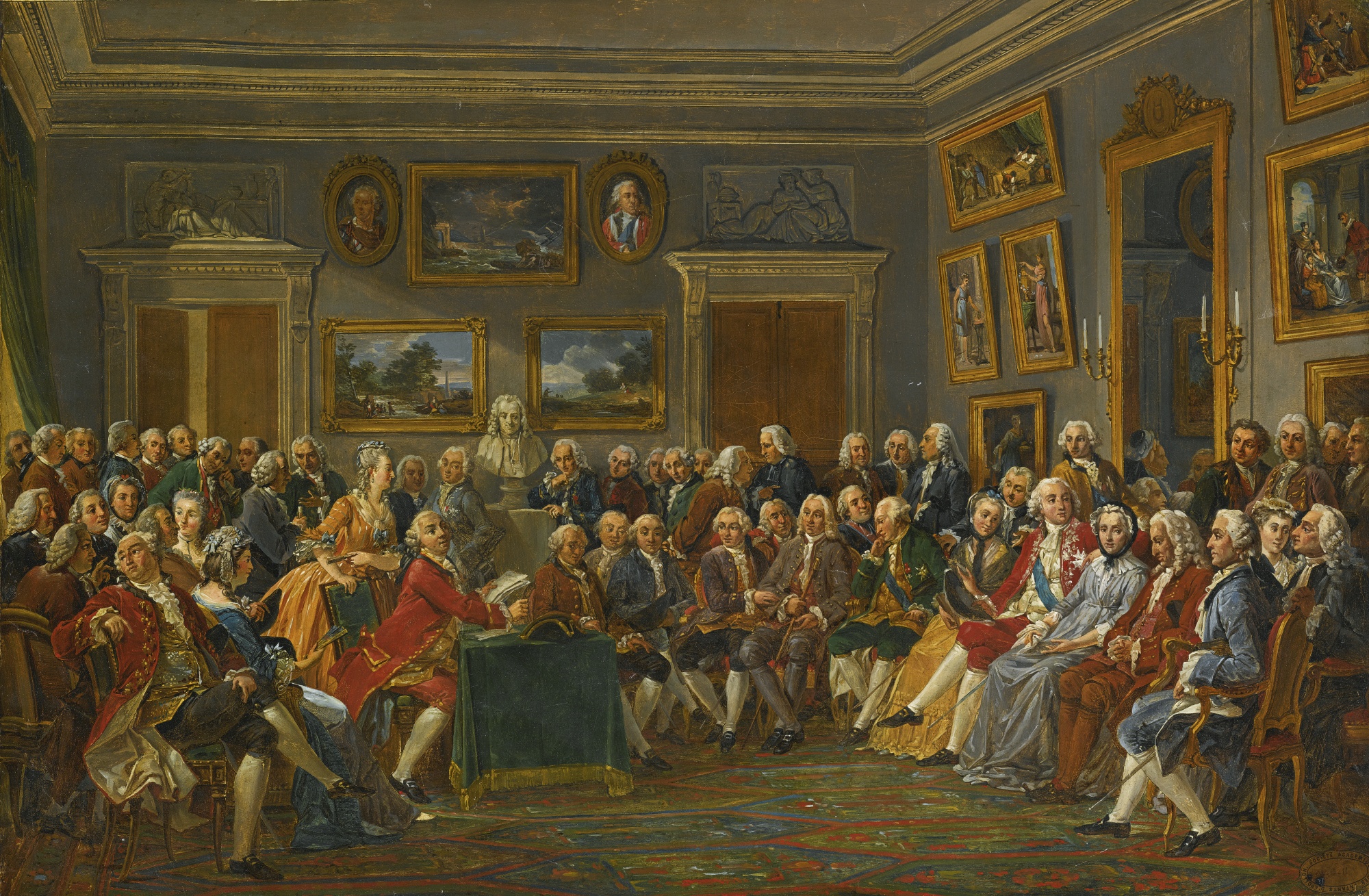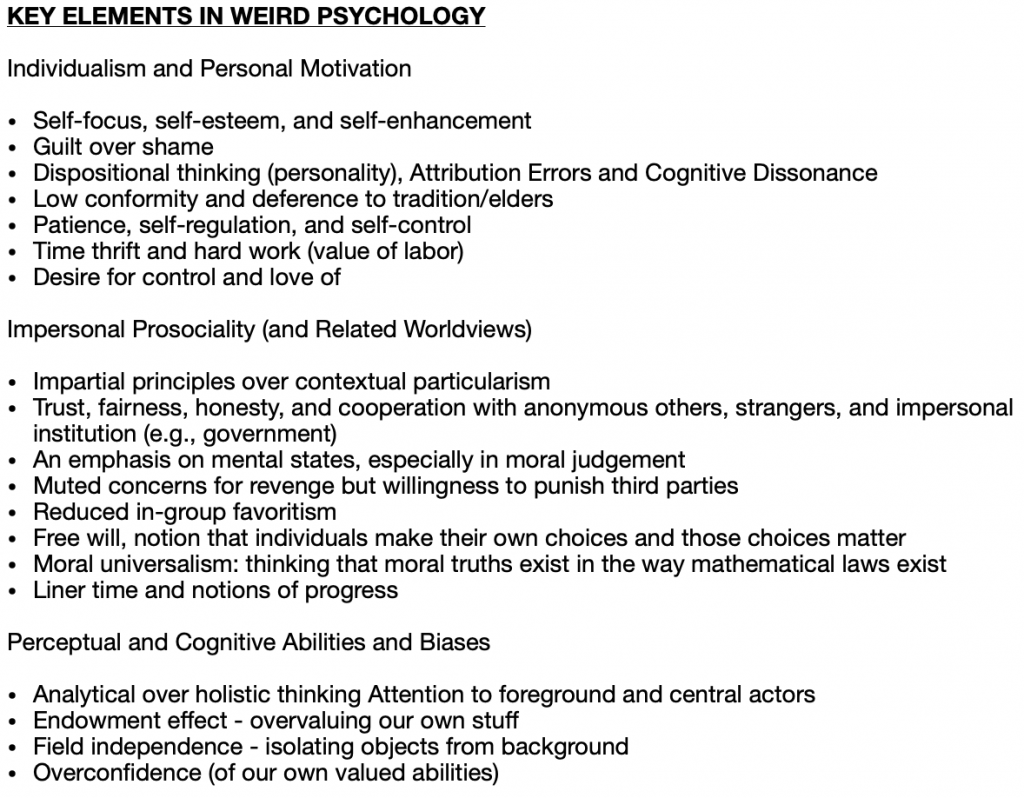
Western WEIRDos
Reviewing Joseph Henrich’s Book: The WEIRDest People in the World, How the West Became Psychologically Peculiar and Particularly Prosperous
It all started with a paper published in 2010 that asks if our ideas about the nature of human psychology are correct. Is there a consistent human psychology across cultures? Seeing as how the population from which we pull our data is largely Western educated undergraduate students, we should expand our net and see if this remains true. You probably already guessed the answer: Absolutely not.
Humanity’s psychological profile is much more diverse than many researchers had assumed. Not only that, but the population most studied tended to anchor “the extreme end of the distribution.” To put it simply, Westerners are the WEIRD ones. WEIRD being an acronym for Western, Educated, Industrialized, Rich, and Democratic, captures the general profile of the bulk of the population from which our “human” psychological profiles are constructed. But guess what? Most humans are not like WEIRD humans.

In studying psychological traits from more diverse populations, Joseph Henrich and his team of researchers found that several traits are unique to WEIRD populations:
“Despite the growing evidence, many psychologists and economists remain either in shock or denial, as it turns out that much of the material in textbooks and academic journals, as well as in popular works of nonfiction, don’t actually tell us about human psychology, but merely reflect WEIRD cultural psychology.”
What changed the Western mind?
Before understanding what, if anything, a WEIRD psychological profile does to a society, it’s helpful to understand the “why” behind the difference. Western minds are WEIRD largely due to our strange marital habits.
Henrich outlines the history of change that occurred from as early as 300 CE when Christian organizations began placing restrictions on marriage that forced people to marry further away from their kin and restricted them to only one wife. These declarations have evolved over the past 1,700 years or so and focused largely on monogamy and non-kin marriage. Some are extreme in restricting marriage as distant as sixth cousins, but mostly it was focused on first cousins, uncles marrying nieces, and in-laws taking the spouses of their deceased siblings along with remaining monogamous.
What these restrictions did was break up social networks that for the span of human history have relied on marriage, tying people to smaller social networks based on kinship. These kin-based networks were what people relied on to foster trust, purpose and meaning. As societies started to grow and depend on agriculture, which also requires defense against out-groups, these kin-based societies grew into clans and their associated networks. Clans kept property tied to their clan by fostering relationships based on these kinship marriages.
Ever wonder why your brother and sister-in-law are relationships based on law? What does that even mean? Well, the “law” portion comes from Canon law of the church forbidding marriage to your dead brother’s wife because you should treat her as a sister. Previously, this type of marriage would occur in order to keep resources in a kin-based network upon the death of one of its men.
Once the Western Christian church started to restrict marriages that tied people to these tightly knit familial structures, the search for a mate expanded beyond their kin and beyond their clan, breaking up these networks not just for peasants and farmers, but for the ruling classes as well.
Products of WEIRD Western minds
Well, ok. People in the West are different in that their psychological profile varies from that of people in non-Western nations. So what? What, if anything, does that translate to?
People who no longer have deeply imbedded kin-based social networks and ties still seek out social organizations and resources. What changed is that people began to create their own voluntary based social organizations like guilds. The lack of a predetermined social network and seeking out a replacement for it for each individual person is what helped to foster the individualist mindset typical of WEIRD people.
Just imagine two general scenarios. In one you are born into a clan of people where you have some type of close familial relationship to dozens of human beings you interact with daily. You likely will marry someone you’ve known all your life who is a first or second cousin.
In another scenario, you have a mother and father, maybe some siblings. Anyone else is not family and has no specific ties to you outside of living somewhat close to your family’s home. When the time comes to create your own family, instead of having a possibly pre-arranged marriage, you have to seek out a mate with whom you have no formal ties and voluntarily decide to create a family with them in your own home away from the land where you grew up.
Many possible scenarios exist, but the main difference here is the individual choice and effort it takes to create your own small family unit. This process puts an emphasis on each individual’s ability to make decisions which will affect the rest of their lives and helps to foster the individualism typical in WEIRD psychology. And the rest is history.
These individually minded people who voluntarily enter into marriage through individual choice still need social networks. Because kin-based social networks no longer exist, or are on the way out as kin-based marriages are no longer allowed, they start to create their own voluntary networks. These networks include guilds, churches, and importantly, markets.
Operating in markets with strangers takes trust. You need to trust that what you provide for the product or service you receive will be worth the exchange. Ideas about the implicit good of fairness and individual character over nepotism start to take hold as widely expected social norms. All of these changes and much more evolve and add up to the types of traits outlined above, taken from Table 1.1 in the text.
Protestant Booster Shot
Protestantism operates like a booster shot for groups of people who already possess psychological traits that fit with a religious doctrine that encourages individualism.
By the time of the Protestant Reformation, the Western church had been experimenting with marriage systems that were breaking up kin-based social networks and fostering more individualistic psychological traits for more than a thousand years. When Martin Luther introduced the doctrine of solo scriptura, individualism went from a product of this new type of marriage to a spiritual journey that literally changed the structure of our brains.
“A society in which 95 percent of adults are highly literate would have, on average, thicker corpus callosum and worse facial recognition than a society in which only 5 percent of people are highly literate.”
The doctrine of solo scriptura posits that the Bible is the sole source of divine truth. It is therefore the responsibility of each individual person to connect with that scripture outside of the mediating structures of the church. This means each individual needs to read the Bible, which means that each individual needs to read. And in a world where most people couldn’t read, this was a revolutionary change that fostered literacy and the widening utilization of the printing press.
Henrich does a nice job of outlining and mapping the effects of Protestantism by tying the expansion of it to the expansion of not only literacy, but many of the psychological traits listed above. Interestingly, it isn’t simply Christianity that has this effect, but even comparing Protestant to Catholic expansion show differences between the two versions of Christianity. The differences in literacy between the two hold that the changes were more specific to Protestantism even though it was also apparent in Catholic areas as well. Even within countries it holds true, as seen by the differences between the north and the south of Italy which have literacy and social differences Henrich and his team were able to tie directly to the expansion of the two types of Christianity.

Often when discussing cultural changes throughout the Enlightenment and Industrial Revolution, I hear what sounds like a sudden shift from religious mysticism to the discovery of reason and science by brilliant minds which suddenly thrusted us into the modern world. What really looks to have happened was much slower, more deeply complicated, and most of all, much more interesting. What many great Enlightenment thinkers were likely doing was recognizing a change in pattern between different types of societies, and brilliantly articulating what has come to be known as the Western, or WEIRD, mind. Or as Constitutional historian Donald Lutz put it when discussing great American theorist John Locke, “Locke is more American than Americans are Lockean.”
This view of cultural evolution also raises a lot of questions. Can we export democracy to nations full of people who literally have a different psychology? What, if anything, can be done to foster that type of change? Should we even do anything to foster that type of change when it took more than a thousand years to do so in WEIRD nations?
Joseph Henrich addresses some of these and more questions in this brilliant book steeped in evidence for his claims.
I was reminded of my time in Afghanistan and the long history of nations trying to affect change in that area of the world. Henrich quotes a discussion with a clan leader in southern Afghanistan when the clan leader was asked about voting in the democrat elections the United States helped to run during our last “intervention.” His decision was based not on the political views of the candidate he chose, but on the candidate’s ties to his clan, and that the candidate’s cousin was married to one of his own cousins. A WEIRD mind would have big problems with that thought process.
One of my favorite things about this book is that it challenges widely held views of history. Whether you’re a fan of liberal Enlightenment and think that it burst on the scene because of a few brilliant thinkers, or you think that Western civilization is a product of nothing but selfish oppression, you’re going to deal with some cognitive dissonance, which in itself is a characteristic of WEIRD minded people.
I could easily see this as a textbook for a years worth of graduate classes in psychology, cultural evolution, or anything in the humanities. It’s definitely one of the best books in content, importance, and structure that I’ve read this year, and it will forever shift the way I understand humanity and our history.
